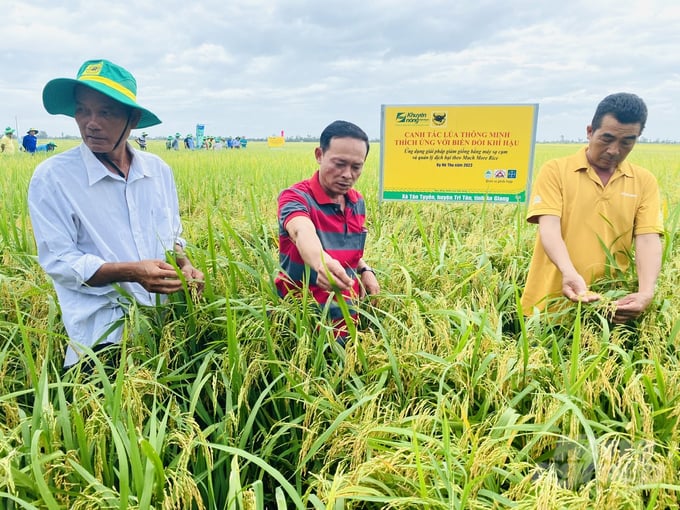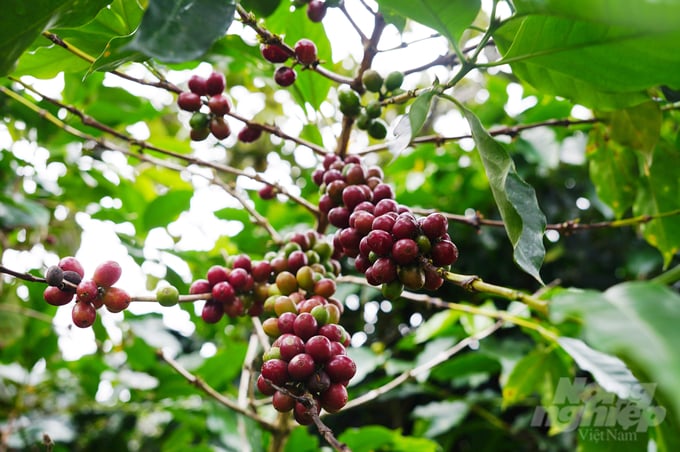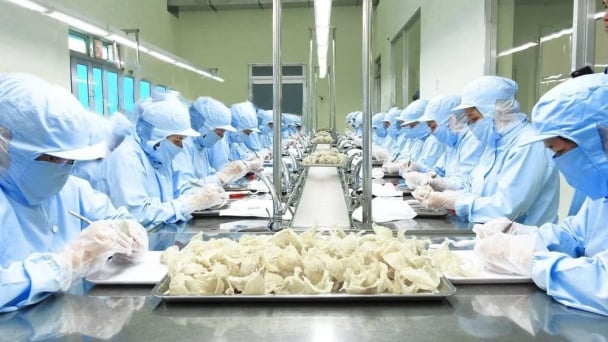May 16, 2025 | 06:15 GMT +7
May 16, 2025 | 06:15 GMT +7
Hotline: 0913.378.918
May 16, 2025 | 06:15 GMT +7
Hotline: 0913.378.918

The "Gao Viet Nam" brand was registered for intellectual property protection in 2018. Photo: Le Hoang Vu.
This information was presented at the workshop on "Improving Legal Policies for the Development of Agricultural Product Brands," organized by the Department of Quality, Processing, and Market Development, the Ministry of Agriculture and Rural Development, in Ho Chi Minh City on December 4.
According to Mr. Nguyen Nhu Tiep, Director of the Department of Quality, Processing, and Market Development, Vietnamese agricultural products possess multiple advantages in terms of geographical location, soil, climate, and the creativity of farmers. However, these products face challenges in terms of low competitiveness, high production costs, unstable quality, and a lack of branding. Despite having nearly 11,000 high-quality OCOP products, Vietnam's international brand recognition remains limited. The export value of agricultural products is significant, but their quality and competitiveness are severely lacking.
According to Mr. Tiep, establishing brand presence is crucial to enhancing the competitiveness of Vietnamese agricultural products.
Ms. Nguyen Mai Huong, Deputy Director of the Rural Development Center under the Institute of Policy and Strategy for Agriculture and Rural Development (IPSARD), stated that Vietnam's agricultural export turnover reached 53.22 billion USD in 2022. Notably, there are 11 groups of products which achieved an export turnover exceeding of at least 1 billion USD; 7 groups of products which achieved an export turnover of 3 billion USD, including wood and wood products, shrimp, coffee, rice, rubber, cashews, and fruits and vegetables.
"Vietnamese agricultural products are present in most major import markets around the world, including the United States, the European Union, and Japan. Up to 90% of Vietnamese agricultural products are exported in their raw form, at lower prices compared to similar products from other countries.
Notably, 80% of Vietnam's agricultural exports lack an established brand with distinctive logos and labels, and fail to fully engage in the global value chain," reported Ms. Nguyen Mai Huong.
According to IPSARD, businesses are exhibiting a growing interest in participating in the national brand program, with the total number of businesses rising each year. Following eight evaluation sessions in 2022, 325 products from 172 businesses have been recognized as national brands. However, only 30 businesses feature products in the fields of agriculture, forestry, and fishery.
According to Ms. Huong, the issue of building and developing agricultural product brands has been discussed extensively without conclusive solutions. There is a distinct lack of detailed strategy or comprehensive program tailored to agricultural products. Additionally, stakeholders are unable to establish a stable connection. As a result, only two products in the main national agricultural product group have been registered for protection in Vietnam: the "Cao Su Viet Nam" brand in 2016 and the "Gao Viet Nam" brand in 2018.
The "Gao Viet Nam" brand is owned and managed by the Ministry of Agriculture and Rural Development. As of October 2021, the "Gao Viet Nam" brand has been registered for protection in 22 countries. However, due to legal issues in the management and use of the certification mark, no businesses have been granted the right to use the certification mark in the production and trade of products. The process of registering/extending protection in foreign countries is challenging due to a lack of funds for registration and maintenance.
The "Cao Su Viet Nam" brand is managed by the Vietnam Rubber Association. As of November 2022, usage rights have been granted for 89 products from 31 factories under 19 businesses. Additionally, the brand has been registered for protection in Taiwan, China, India, Cambodia, among others.
Regarding the high-quality "Ca Phe Viet Nam" brand, an application has been submitted to the Intellectual Property Office. Additionally, the Ministry of Agriculture and Rural Development has issued a framework plan for national products including shrimp, edible mushrooms, and medicinal mushrooms.

The high-quality 'Viet Nam Ca Phe' submitted a registration application to the Intellectual Property Office. Photo: Nguyen Thuy.
"The majority of Vietnam's national brand programs and food brands have not received sufficient budget allocation. There is also no specific mechanism or policy to encourage businesses with achieving the national brand status. As a result, the response and involvement of businesses in the National Brand Program are restricted. There are currently too many types of awards, selections, and votes for product brands and business brands, which reduces the potential of national brands. There is also a lack of a common legal framework for using the national geographical name (Vietnam) to register protection for key national agricultural products," noted Ms. Huong.
According to Ms. Huong, agricultural brands are increasingly influential in the development of agriculture and rural areas, contributing significantly to attracting resource investment from every level of the government. In addition, community brands have helped local governments develop collective organizations in association with major governmental programs such as OCOP, new rural construction, and so on. The intellectual property protection framework is developing rapidly. Additionally, Vietnam's membership in the Madrid Protocol and the Madrid Agreement enables business and collective brands to register on the World Intellectual Property Organization's single-window information portal.
Furthermore, businesses and corporations with management capacity, financial strength, and international experience have emerged in the construction and protection of Vietnamese agricultural brands in both domestic and international markets, such as TH True Milk, Vinamilk, Hoang Anh Gia Lai, among others.
However, Vietnamese agricultural products face numerous limitations which require careful planning in the process of formulating strategic policies in the near future. Namely, there is a lack of an overarching strategic direction at the national level for the establishment of agricultural brands, and resources are dispersed. In addition, the management and development of agricultural brands are restricted without a dedicated management agency.
According to Ms. Huong, the development of agricultural brands requires the application of science to create high-quality products, reorganize production, and establish standards for product groups.
There is a need for capable businesses to participate in the development of national brands on a large scale. This will support the promotion of agricultural products, with policies to support businesses/cooperatives participating in building and developing brands. It is essential to develop major brands towards common benefits, protecting reputable Vietnamese agricultural brands, and creating a favorable ecosystem for the development of agricultural brands by promoting high-quality value chain. On the other hand, associations and cooperatives need to coordinate to protect their brands. Additionally, local governments should provide guidance on building, managing, and developing brands.
Mr. Ta Manh Cuong, representing the Trade Promotion Agency under the Ministry of Industry and Trade, posits that the potential of Vietnamese agricultural products is not universal. Namely, a promising product may not possess similar potentials across all 63 provinces and cities. Similarly, a product demonstrating potential in one province may not necessarily exhibit the same level of potential across all communes and districts. Consequently, targeted support for brand development is essential, with a strategic focus on individual products.
On the other hand, there is a need for policies which focus on overall improvements in quality, thereby creating a brand for the entire industry.
"In the short term, it is necessary to develop an entire legal framework with regards to issues of quality, product development, preservation, and processing for a specific industry. Subsequently, we can this framework to cover other industries," emphasized Mr. Cuong.
Translated by Nguyen Hai Long

(VAN) Japan's efforts to lower the price of rice through the release of its stockpile may finally be making some progress, albeit at a snail's pace.

(VAN) U.S. tariffs are not only a 'shock', but also an opportunity for Vietnamese businesses to renew their mindset toward comprehensive development.

(VAN) As Bac Giang lychee enters the harvest season, Minister Do Duc Duy expects that the fruit will contribute greatly to agricultural exports due to standardized production and deep processing.

(VAN) Consumers have shown a preference for free-range eggs, but those farming systems are more vulnerable to biosecurity risks like bird flu.
/2025/05/09/5701-1-184335_301.jpg)
(VAN) Vietnam’s eel exports nearly doubled thanks to a mud-free farming model, opening up new prospects while still facing numerous barriers related to international standards.

(VAN) Minister Do Duc Duy warned that if production is not professionalized and supply chains are not transparent, the U.S. market could become a growth bottleneck.

(VAN) Delegating surveillance responsibilities to local authorities is a cost-saving and efficiency-boosting measure that removes a key bottleneck for enterprises, according to Director General Duong Tat Thang.